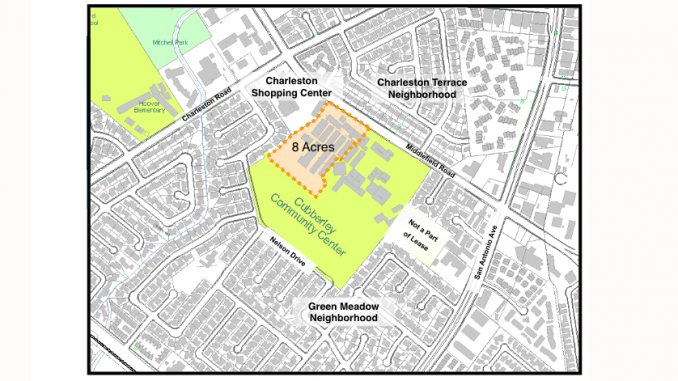
BY SARA TABIN
Daily Post Staff Writer
Palo Alto’s school district stands to lose over $5 million because the city is considering terminating its Cubberley Community Center lease to save money next fiscal year.
Both the school district and the city are preparing for deep budget cuts because tax collections are expected to drop due to the COVID-19 economic slowdown.
The city is predicting a $20 million loss by June and deeper losses when the new fiscal year starts July 1. City Manager Ed Shikada said all options need to be on the table.
One possible cut he listed in a memo to council is not renewing the city’s lease of 27 acres of the Cubberley Community Center from the school district. The city also owns eight acres at Cubberley. The city sublets the property to various nonprofits.
The city didn’t talk to the district before announcing the idea.
The city’s lease for the property expired last year and the lease has gone to a month-to-month arrangement that can be canceled at any time by either party. While both the city council and school board indicated last fall that they wanted the city to have a new long-term lease, the agreement was never finalized.
School Superintendent Don Austin told the Post he called Shikada on Tuesday after reading about the suggestion of cutting out Cubberley in the press.
Austin said the district and city will have many conversations before any decisions are made. He said he respects Shikada and believes the two parties will find a solution together.
He said the district would lose $5.4 million if the city stops leasing the land.
“There aren’t great answers to most questions facing us right now,” he said. “This is just the latest example.”
Shikada said in a statement that the lease is just one of many options being explored. He said the city will factor the financial impact to PAUSD into its decisions.
Austin said at tonight’s school board meeting that the Cubberley situation was a “curveball” but he doesn’t want anyone to panic.
District Chief Business Officer Carolyn Chow said the district will face its own financial hardships because of COVID-19. She said the state is no longer in a budget surplus so state funding could be cut.
She said the district is also losing money because it is paying cafeteria workers but not selling meals and because of loss of facility use fees. The district is also paying for new expenses like laptops for kids stuck doing schoolwork at home without a computer.
She said the termination of the Cubberley lease would have a significant impact. Chow said the district is saving some money because it is paying less in utility bills.
The district might lose tax revenue in the coming years.
County Assessor Larry Stone said 2021 property taxes could be reduced if housing prices crash because of COVID-19. Since the assessors legally have to assess value on Jan. 1, the tax bills people get this October won’t be impacted.
Board member Todd Collins said the district is flying blind because they don’t know how big of a hit the budget will take.



I’d like to know why the City and PAUSD didn’t enter into a long-term lease last year? If that had happened, the City couldn’t be pulling this now. Who dropped the ball?
Please correct my if I am wrong, but I believe the city did not want to get into another long-term lease.
@JLS Parent, I think the facts would show you’re correct, even though the city probably wouldn’t admit it. Back in September, Don Austin thought he had a deal with the city for a five-year lease and he announced it to the school board. https://padailypost.com/2019/09/25/city-schools-reach-a-tentative-agreement-to-extend-cubberley-lease/ And on Oct. 7, the City Council by a 6-1 vote endorsed the deal but didn’t actually approve it. Then the lease went to the bureaucrats, who dragged their feet and wouldn’t publicly say why they weren’t coming back to council for final approval. There’s clearly some disconnect between the council and the bureaucracy on this one. The council, particularly those seeking re-election this year, want to be seen as being on the side of PAUSD even if they’re not. Nobody on council objected to the bureaucrats stringing the district along.
The lease went to month-to-month, and now it’s on the verge of being canceled by the city. The city owes the community an explanation for why they refused to approve this lease last fall. My guess, and I’m not an insider, is that the city is objecting to the school district’s long term plans and was using the lease as leverage. The biggest dispute seems to be housing on the Cubberley site. The city wants housing there and while the district was in favor it, the school board backed off after being pressured by the neighbors. Anyway, the city holds a powerful cudgel it can use against the school board: the lease is $5.1 million a year and the city contributes $1.9 million a year towards the Cubberley Infrastructure Fund. That’s $7 million. If the school district were to take over the 27 acres the city now leases, it would presumably receive the rents from the nonprofits there. But the city has kept those rents well below market rates, so we’re talking maybe $1 million a year. And, as Austin said when asked about teacher housing, he didn’t want to get into the property management business (though one would assume that could be outsourced).
If the city were to drop its lease and sell its 8 acres to the school district, this would solve a lot of problems. Instead of the city and school board playing tug-of-war over Cubberley, the decision-making would be entirely in the school board’s hands.
I’m not saying they’re geniuses or anything. Far from it. And their new superintendent is turning out to be a bumbler.
But total control would give the school board the ability to decide exactly what it wants on the site, one school, two schools, three schools, teacher housing, a new admin building, etc.
And a school district has the distinct advantage of being able to pass a bond issue with only a 55% vote compared to the city, which would need two-thirds.